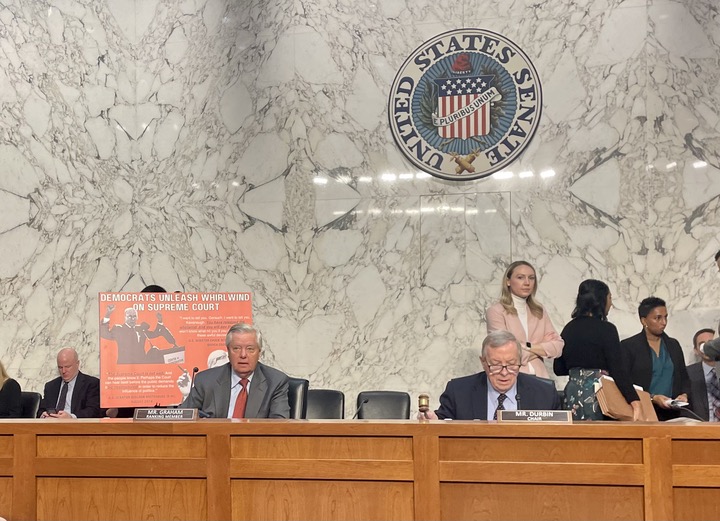WASHINGTON — The Senate Judiciary Committee authorized subpoenas Thursday to two individuals with close ties to Supreme Court justices, moving forward with an investigation into the personal conduct of the justices and potential conflicts of interests.
The subpoenas order billionaire conservative donor Harlan Crow and long-time conservative judicial activist Leonard Leo to share records that document their financial and social connections to conservative Supreme Court justices.
The motion to authorize the subpoenas passed 11-0. All the Republican senators on the committee staged a walkout in opposition to the subpoenas before the vote.
“Leonard Leo continues to ignore our efforts, and Harlan Crow has refused to provide a sufficient response,” said Sen. Dick Durbin (D-Ill.), the chair of the Judiciary Committee.
The subpoenas came as the Supreme Court released its first-ever “code of conduct” earlier this month, which outlines ethics guidelines that justices have to adhere to, following a series of high-profile ProPublica investigations.
The publication reported in April that Justice Clarence Thomas took a nine-day vacation on a yacht, estimated to exceed $500,000 in value, paid for by Crow. ProPublica also found that Justice Samuel Alito accepted a $100,000 luxury fishing vacation with a hedge fund billionaire, who had business interests in cases that later came before the Supreme Court.
All nine justices endorsed the new code. But, Democratic lawmakers have questioned its effectiveness, pointing to the lack of an enforcement mechanism.
The code includes broadly-worded guidelines, like requirements to “uphold the integrity and independence of the judiciary” and “avoid impropriety and the appearance of impropriety in all activities,” but it did not specify who will enforce those standards.
During the meeting, Durbin said the code falls “far short of what to expect from the highest court in the land,” and a congressional investigation remains “appropriate and necessary.”
“Without a new, stronger ethics regime, how can the public trust that the justices will, indeed, refrain from such impropriety from the future?” he said.
Shortly before the committee voted on the subpoenas Thursday, Majority Leader Chuck Schumer (D-N.Y.) endorsed the effort from the Senate floor.
“The hypocrisy is undeniable, and the American people see right through it. Having these very same billionaires who are pushing cases through the Court have the ability to travel in jets and go to resorts and buy them gifts, it’s just outrageous,” Schumer said.
But Sen. Lindsey Graham (R-S.C.), the committee’s ranking member, said the effort was “political theater” and the subpoenas are “a bunch of garbage.”
If there were concerns about ethics, the committee should, likewise, investigate Justice Sonia Sotomayor, whose staff pushed universities to purchase her books before hosting her to speak, he added.
“I don’t buy it one bit [that] this is about fixing a problem,” Graham said. “This is about an ongoing effort to destroy this court, to destroy Clarence Thomas’s reputation.”
Graham also pressed Durbin and Judiciary Democrats to urge Schumer to bring the Supreme Court Ethics, Recusal, and Transparency Act to the Senate floor for a vote. The act, which passed a committee vote in July, would strengthen financial disclosures requirements, publish a code of conducts for justices and set standards for recusal.
“You’re doing an investigation to fix a problem that you’ve already had the legislative solution for,” Graham said. “The reason we haven’t voted on that bill, Mr. Chairman, and never will because there’s just not the votes.”
Sen. John Cornyn (R-Texas), also pushed against the subpoenas. He said the committee is setting a dangerous precedent of issuing subpoenas to private citizens “for any purpose that they may please.”
The Judiciary Committee first met in early November to vote on issuing subpoenas to Crow and Leo. But the meeting ended abruptly after Republicans on the committee submitted amendments to also subpoena people associated with the Biden administration.
According to Senate rules, Congress can ask the judicial branch to enforce the subpoenas by a vote on the chamber floor, subject to the filibuster, if Crow and Leo do not comply. But the Judiciary Committee will need all Democratic and at least nine Republican votes to overcome the filibuster. It is unlikely that the Democrats will have the votes to clear this procedural hurdle.


